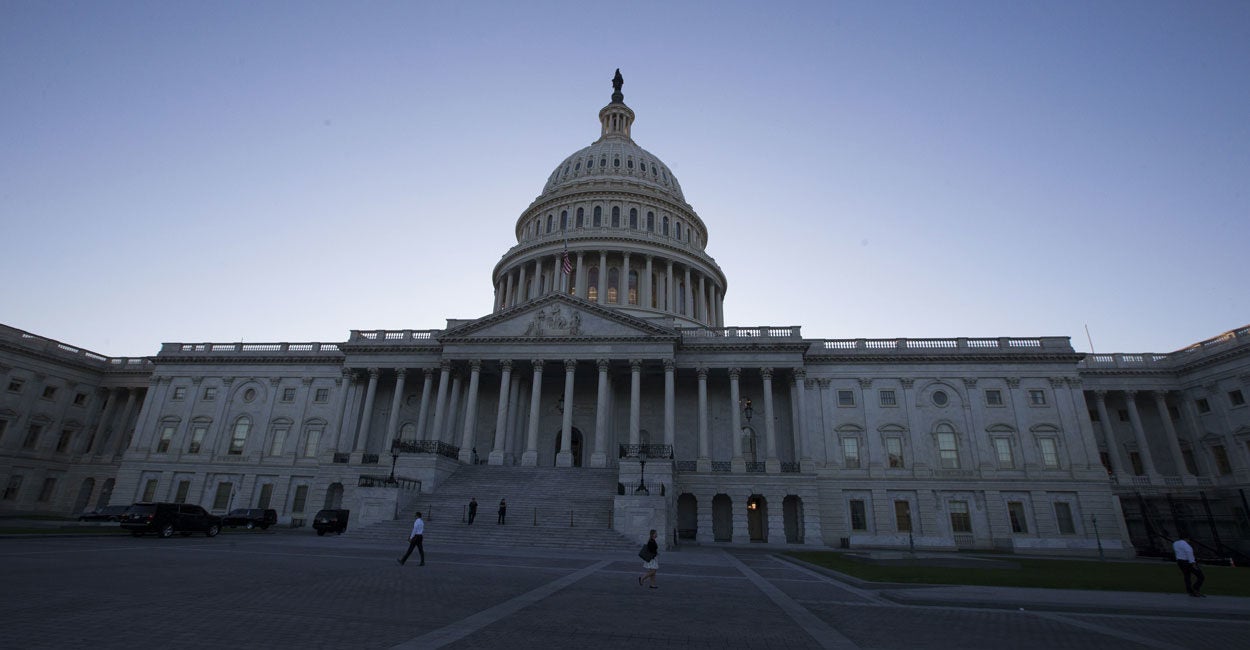Tax reform’s promise was simple. American families will send about $2,000 less to Washington each year. But that won’t last if we continue to have deficits of $5,600 per family per year, as we did in fiscal year 2017. (Photo: Alex Edelman/ZUMA Press/Newscom)
More than $21 trillion in debt, it looks like Washington has forgotten some basic economics.
Peacetime and a strong economy are universally agreed upon criteria for when governments should start to reduce spending and pay down the debt, and we’re not doing it. Instead, Washington is in the process of passing appropriations that are a dramatic departure from anything resembling fiscal or economic sanity.
The now-certain return of trillion-dollar deficits threaten to undermine Republicans’ most significant legislative and economic accomplishment: tax reform. In stark contrast to government spending, properly designed tax cuts let people keep more of their own money and expand economic opportunity.
Tax reform’s promise was simple. American families will send about $2,000 less to Washington each year. But that won’t last if we continue to have deficits of $5,600 per family per year, as we did in fiscal year 2017.
U.S. agencies such as the Congressional Budget Office and international bureaucracies such as the International Monetary Fund all seem to agree that tax reform will boost the U.S. economy, but unprecedented levels of debt and large deficits threaten to drag economic growth back down in the following years.
The Heritage Foundation’s 2019 “Blueprint for Balance” [https://www.heritage.org/blueprint-balance] presents a path out of America’s rocky financial straits. It provides specific recommendations and detailed policy reforms that aim to strengthen America’s economy, society, and defense. Most notably, the Heritage budget achieves surpluses and begins to pay down the debt in 2024 and permanently extends the 2017 tax cuts.
Tax reform already has created opportunity for businesses and workers. More than 600 businesses have said that they have offered new and improved benefits to their workers because of the tax reform—higher wages, bigger bonuses, and better retirement plans.
Layoffs are rare and employers are hiring. Unemployment is close to historic lows at 3.8 percent, which is the lowest rate since 2000. Small businesses are more optimistic than ever, as measured by the National Federation of Independent Business’ Small Business Optimism Index, and businesses are again increasing investment in America. New business investments in real estate, equipment, and factories jumped more than 21 percent compared with the first quarter of last year.
Yet, the growth from tax reform could be more than 50 percent larger over the long run if American workers and investors were certain their new lower taxes would continue. The 2017 tax cuts are largely temporary, and a sustainable budget is a necessary precursor to permanently cut America’s taxes. In other words, if you like your tax cut and want to keep it: Washington must control its spending habit.
The 2019 “Blueprint for Balance” sheds light on what our federal budget and economy could look like under a more sustainable federal fiscal policy. If Congress wants the American people to continue to prosper, it must urge Congress to consider the recommendations in the Heritage blueprint to begin the process of unleashing a stronger country.
[italics emphasis mine]
Adam Michel focuses on tax policy and the federal budget as a policy analyst in the Thomas A. Roe Institute for Economic Policy Studies at The Heritage Foundation. Randi Doran is a member of the Young Leaders Program at The Heritage Foundation.
-------------------------------------------------------------------------------
"Trump Celebrates 6 Months of ‘New Jobs, Bigger Paychecks, and Keeping More of Your Hard-Earned Money’" - Fred Lucas / @FredLucasWH / June 29, 2018; https://www.dailysignal.com/2018/06/29/trump-celebrates-6-months-of-new-jobs-bigger-paychecks-and-keeping-more-of-your-hard-earned-money







I'm not completely sure that tax cuts are the answer, but they very well may turn out to be helpful. Because we can't know for sure that tax cuts will have the intended benefits, I think Congress should have the flexibility of changing the budget annually instead of guaranteeing permanent tax cuts. What might be helpful is if Congress abided by a rule: If spending is less than S and if economic growth exceeds E, then the tax cuts WILL continue - otherwise, we need to cut our losses and increase taxes. A guarantee, like what is advocated in the article, but a conditional guarantee to ensure that we can make changes if necessary.
ReplyDelete-herb